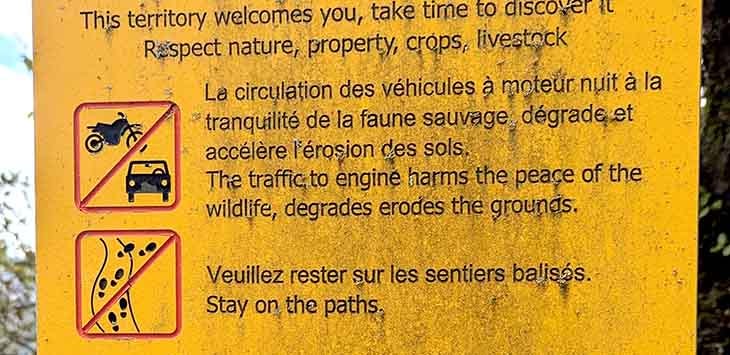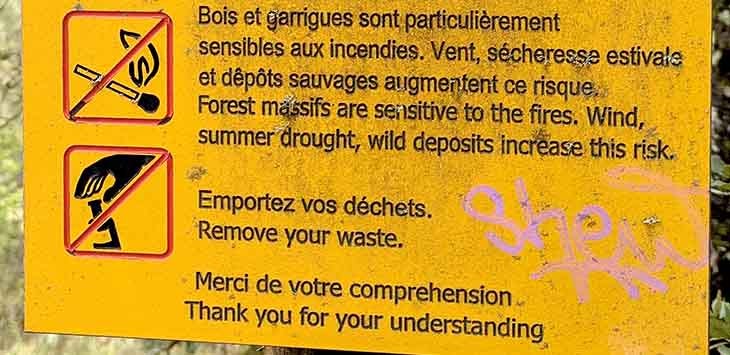Will AI put an end to English Manglage? Please, no! Don’t suck the fun out of naff translations!
To err is human: that’s what makes it funny
One of the charms of being a Britishman abroad is being able to enjoy the mangling of English.
It is charming because poor translation – on street signs, tourist information boards and in shops – usually arises out of honest goodwill. Whether it’s intended for tourists or business travellers, mangled English is a joyful, if poorly implemented, expression of the desire to be helpful to visitors. After all, the mangler could have chosen not to bother at all and kept those all-important safety instructions for themselves, written in their own lingo and no-one else’s, so there.
Just imagine the nonsense that English-speaking natives must come up with when we try to write in other languages! So I’m not poking fun in one direction. The amusement is mutual.
Anyway, here is a typical example on a sign Mme D and I came across while hiking the other day. It advises French- and English-speaking ramblers from the city how to behave in the countryside.

Eh? It’s a gentle salad de mots. Not only does it apply clumsily super-literal translations – “La circulation des véhicules à moteur” simply means motorised traffic – it manages to ignore some of the original words completely, mangling the result even further.
The sign continues…

What’s a “forest massif”? You may well ask. It’s almost franglais, and quite possibly unintelligible in both languages. The original French is “bois et garrigues” which means woods and scrubland, so where the mountainous forests came from is anyone’s guess.
And “wild deposits”? The French is “dêpôts sauvages” which, due to a subtle spelling mistake, surreally warns hikers against spontaneously erecting unauthorised storage facilities. Spelt correctly as “dépôts sauvages”, it means “fly tipping”.
Given that tourists may misinterpret “wild deposits” as meaning something rather more scatological than fly tipping, no wonder the sign insists you should also “remove your waste”. Thank you for your understanding.
I like to call this phenomenon English Manglage.
Keep reading with a 7-day free trial
Subscribe to [Autosave is for Wimps] to keep reading this post and get 7 days of free access to the full post archives.
![[Autosave is for Wimps]](https://substackcdn.com/image/fetch/$s_!Xki4!,w_80,h_80,c_fill,f_auto,q_auto:good,fl_progressive:steep,g_auto/https%3A%2F%2Fbucketeer-e05bbc84-baa3-437e-9518-adb32be77984.s3.amazonaws.com%2Fpublic%2Fimages%2F6074c205-ec66-434d-a31c-d8b26b9e2c52_256x256.png)

![[Autosave is for Wimps]](https://substackcdn.com/image/fetch/$s_!Xki4!,w_36,h_36,c_fill,f_auto,q_auto:good,fl_progressive:steep,g_auto/https%3A%2F%2Fbucketeer-e05bbc84-baa3-437e-9518-adb32be77984.s3.amazonaws.com%2Fpublic%2Fimages%2F6074c205-ec66-434d-a31c-d8b26b9e2c52_256x256.png)

